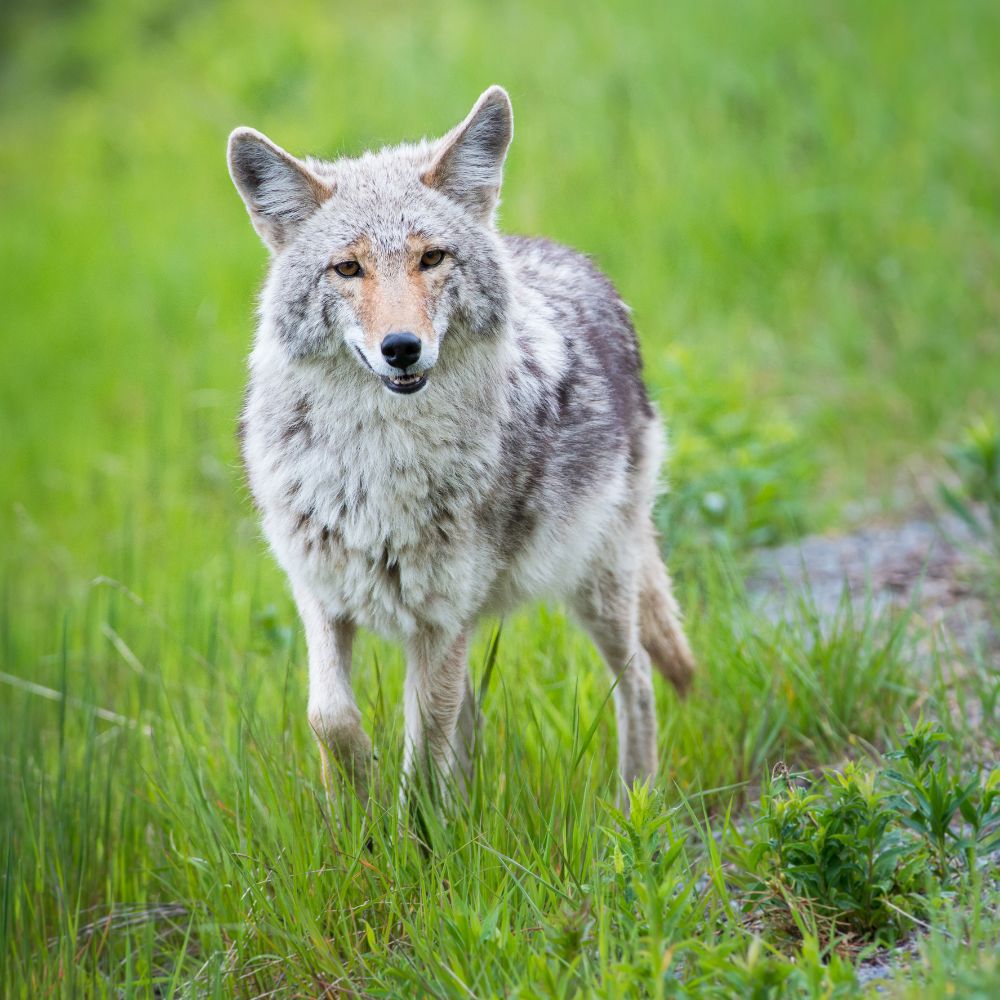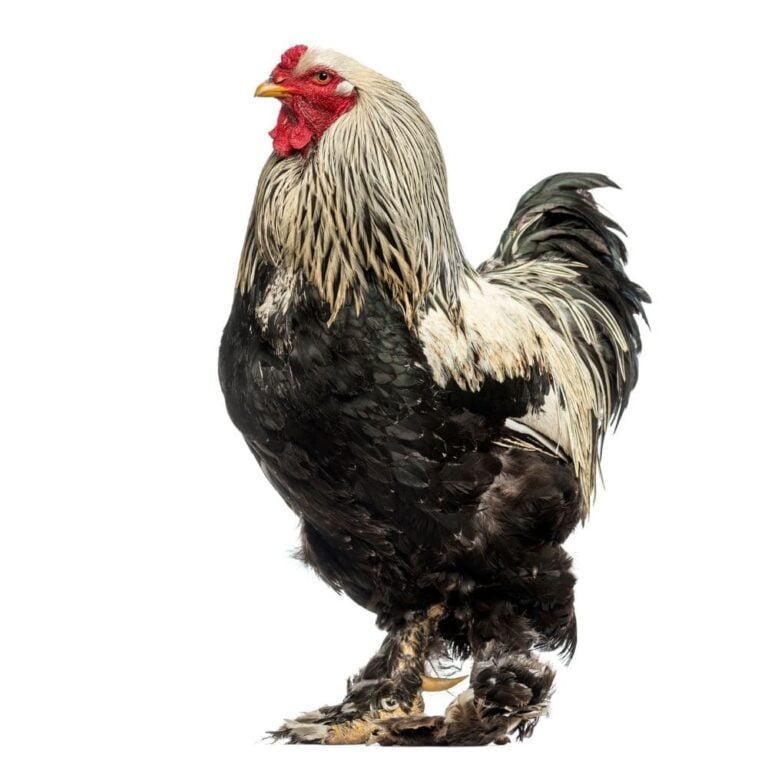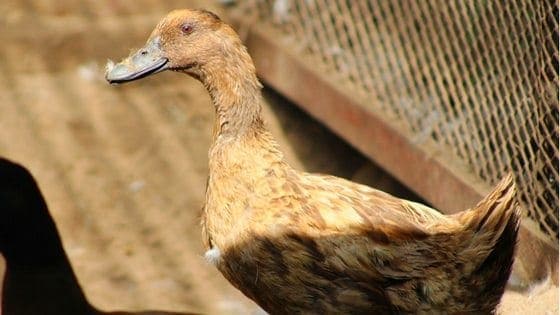If you are a backyard chicken keeper then you have an amazing life. However, even the most fantastic life can have challenges and when it comes to poultry parenting chicken predators are your enemies.
From foxes and raccoons to hawks and snakes, there are numerous animals that see chickens as a tasty meal. Keeping your feathered friends safe from these predators is a top priority. So, let’s dive into the world of chicken predators and learn how to protect your flock from harm.

Table of Contents (Quickly Jump To Information)
Top 5 Chicken Predators
#1 Domestic Dogs
Dogs may be man’s best friends, but they aren’t always good friends for chickens. Sure, you may have trained your own dog to understand that your pecking pals aren’t dinner – but neighbor dogs, or stray dogs, might be a different story.
If you know just a few families that own chickens then you have likely heard stories of a dog killing half their flock at some point in time.
I have personally been the owner of a dog that got out of our yard due to a failed underground pet fence – who then killed several of my neighbor’s chickens. It was tragic. We had to find another home for the dog (thankfully our little Peanut is thriving there) and replace our neighbor’s chickens.
The truth is that dogs have a natural hunting instinct, it’s just the way it is. If they are not properly trained they can put the hurt on your flock in a hurry. Even well-behaved dogs may see suddenly see chickens as a toy to play with especially if they are bored. We even have a wiener dog that has to be kept separate from our flock because his natural drive to hunt is undeterrable.
Dog Training
To prevent your dog from harming your chickens you will have to work diligently. It’s easiest if you train your dog from a puppy to be around the flock. I trained my current farm dogs by walking them through the coop as little pups every day as I did chores. The chickens pecked at them and it was scary. That was all it took. There are ways to train adult dogs as well, but that’s for another day.
When it comes to neighbor dogs or stray dogs, your only plan of action is to have your flock in a safe coop or run. I have personally started free ranging my chickens and just take the risk during the day. But I lock them up safely at night in a predator-proof coop.
#2 Hawks as Chicken Predators
Hawks have razor-sharp talons, incredible vision, and can swoop down on their prey like a stealth bomber. But when it comes to backyard chicken owners, these stealthy birds can quickly become the enemy. They are certainly one of the more common predators out there.
If you’re not careful, your flock could become the main course. So, if you’re raising chickens in an area where birds of prey are prevalent, you’ll need to take measures to protect your chickens from these feathered foes.
It’s sad, but also intriguing to see a hawk do what it was made to do. Nature has a balance that can’t be denied, but you can at least protect your pets.
Bantams and young birds are especially easy for hawks to pick up and fly away with because of their small size.
#3 Owls
Owls are fascinating creatures, known for their silent flight, keen eyesight, and eerie calls. However, for chicken parents, these nocturnal predators can be like a bad dream.
They have a keen eye for spotting prey from high up in the trees, and they are more than happy to swoop down and snatch up an unsuspecting chicken.
If you see or hear owls in the distance you’ll need to be ready to protect your precious birdies (especially at night when owls are active). After all, you don’t want your chickens to end up as a midnight snack.
#4 Coyotes as Chicken Predators
Coyotes have adapted to living in a wide range of environments, from rural areas to suburban neighborhoods. While they are typically thought of as hunters of small mammals like rodents and rabbits, they are more than capable of trying their skills on chickens as well.
These wild dog-like creatures are very sly, cunning, and patient. They’ll wait for the right moment to attack, whether it’s at night in the dark or even in daylight when you least expect it.
Don’t let these wily predators outsmart you – be proactive and take steps to protect your chickens from becoming a coyote’s next meal.
#5 Raccoons
Raccoons are notorious for their mischievous and curious nature, not to mention they can be adorable little creatures with their fuzzy bodies and masked faces.
However, these masked bandits are like the burglars of the animal world, always on the lookout for an easy meal. They’re capable of climbing fences and raiding chicken coops, and once they get a taste for chicken, they’ll keep coming back for more. It’s hard to believe something so cute and fun to watch can be such an evil chicken enemy.
Just remember that your chickens are more adorable and more productive, plus they lay breakfast. So don’t let these sneaky raccoon bandits make off with your prized chickens – be vigilant and don’t get bamboozled by this cute predator.
What Predator Is Attacking My Chickens?
So what do you do if you find a dead chicken, or a missing chicken, or a pile of feathers…or worse. It’s not uncommon to find a chicken without a head or evidence of entrails after an attack. It’s heartbreaking and life-changing. If this does indeed happen, you need to find out who is committing this heinous crime so you can stop them in their tracks.
There are several signs that can help you identify the culprit. The first step is to closely examine any chickens that have been injured or killed. Look for specific clues, such as puncture wounds, scratches, or missing feathers, as these can be key indicators of which type of predator is responsible.
For example, if you notice that your chickens have been bitten on the neck or back, it’s possible that a coyote is to blame. They tend to attack at night and may leave scattered feathers or tracks around the coop. On the other hand, if your chickens are missing entirely and there are no signs of a struggle, it’s possible that a bird of prey, such as a hawk or owl, is responsible.
And then there’s the raccoon. This bandit is known for its intelligence and ability to break into coops. Signs of a raccoon attack may include damage to doors or latches, as well as missing or injured chickens. Keep in mind that raccoons are nocturnal, so they are most likely to attack at night.
If you’re having trouble identifying the predator, consider setting up cameras to video the attacker in action. Or put on camouflage and paint your face black and set up a sting operation😆).
Other Potential Chicken Predators
- Weasels
- Bobcats
- Opossums
- Eagles
- Cougars
- Skunks
- Mink
- Crows
- Wolf
- House cat
Backyard Chicken Egg Snatchers
- Snakes
- Rats
- Skunks
- Opposum
- Raccoon
- Blue Jays
Ways To Scare Off Chicken Predators
If you are losing hens to predators, you need a plan of action… and fast. Here are some ways to help you win the war!
- Install Motion-Activated Lights: Many predators, such as raccoons and coyotes, are scared off by bright lights. You can install motion-activated lights around your chicken coop to scare off predators that approach at night.
- Use Noise-Making Devices: If you, and your neighbors, can tolerate it – loud noises can also be effective in scaring off predators. You can use a motion-activated alarm or even set up a radio near your coop to play music or talk shows.
- Install Fencing or Netting: If you are trying to free-range your chickens, you might have to give in to physical barriers or a pen of some kind. At the very least you could put barriers around the perimeter of your coop at night. This will help keep pesky predators from trying to break into your coop while your flock sleeps. You can also make sure you have the best chicken wire for your situation. Here is an article to help you with that: Chicken Wire For Coops: Buyer’s Guide
- Use Repellent Sprays: I’ve never tried it, but I’ve heard about it. Some commercial predator-repellent sprays are available that contain scents that deter predators. You can spray these around your coop to create an unpleasant non-welcome for predators.
- Hire a Dog: Not just any dog, but a livestock guardian. If you have a properly trained livestock guardian you will not have much trouble with predators of any kind. And they work for food. 😉
- Set Up Traps: You may have to get serious about your predators by setting up a trapping operation. The key is finding a good solution once you’ve trapped the culprit. You may need to call your area conservation department or wildlife services to find out what is acceptable.
- Simply Be Aware: One of the best ways to protect your flock is to keep a watchful eye out for potential predators. Check on your coop regularly and look for signs of predators, such as tracks or damage to the coop. And be diligent about closing the coop door each night.
Remember that preventing chicken predators requires a little bit of work and a lot of observation. By taking a couple of extra steps, you can keep your chickens safe and ensure their continued health and well-being.
Summary
Chicken predators are serious business. If you lose several backyard buddies it can be devastating both emotionally and financially. It’s important to stay on top of things to ensure the safety of your feathered friends. Backyard chickens can be very special pets and they deserve to be protected as much as possible. 💕
Other Helpful Articles
- Chicken Wire For Coops: Buyer’s Guide
- Walk-In Chicken Coops — The Truly Practical Guide
- DIY Automatic Coop Door With ChickenGuard

A happy wife, mother, teacher, writer, hobby farmer, lover of chickens, and contributor to Pampered Chicken Mama!





![How to Raise Baby Chicks So They’re Healthy From Day 1 [Podcast]](https://thefrugalchicken.com/wp-content/uploads/2016/02/how-to-raise-baby-chicks-feature-min.jpg)
![What The Veterinary Feed Directive Means & How I’m Preparing [Video]](https://thefrugalchicken.com/wp-content/uploads/2016/12/veterinarian-feed-directive.jpg)